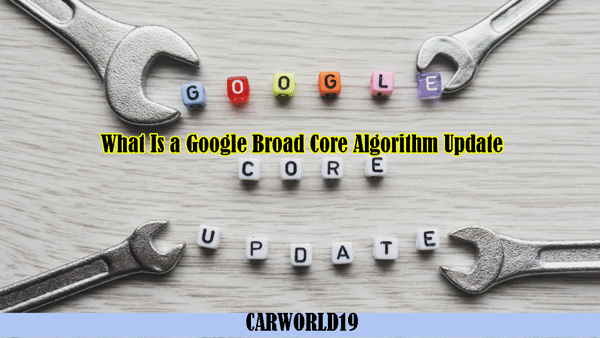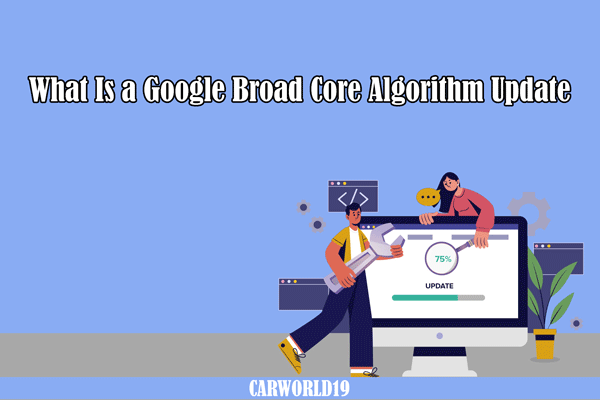A broad core algorithm update is a change to Google's core, or general, search ranking algorithm and procedures.
The basic algorithm of Google is really a set of algorithms that read signals from webpages (e.g., keywords, links, etc.) in order to rank the material that best answers a search query.
After reading this article, you'll have a better grasp of what a core update is and how to recover your rankings if they've been impacted.
 |
| What Is a Google Broad Core Algorithm Update? |
When Google announces a major algorithm update, many SEO experts are left wondering what happened (besides their rankings).
Google's acknowledgment of core upgrades is always hazy, offering nothing more than the fact that the update happened.
Core upgrades are often communicated to the SEO community via the same regular tweets from Google's Search Liaison.
When the upgrade goes live and when it's done, Google will issue two statements, with little information in between (if any).
As a result, SEO experts and site owners are left with a host of questions regarding how the basic change impacted their results.
Understanding what a broad core update is and how it differs from other types of algorithm updates will aid you in determining why a site's rankings increased, decreased, or remained unchanged.
You'll have a better idea of what a core update is supposed to achieve and how to recover if your rankings have been impacted after reading this article.
What Is A Core Update, Exactly?
First and first, let me state unequivocally that Google makes hundreds of algorithm changes every year, frequently more than once per day.
Many of the well-known Google algorithm changes (Penguin, Panda, Pigeon, Fred, and so on) are designed to solve specific flaws or vulnerabilities in the company's algorithms.
In the case of Penguin, it was link spam, and in the case of Pigeon, it was local SEO spam.
They'd all come for a specific cause.
On many occasions, Google (sometimes unwillingly) told us what they were attempting to achieve or avoid with the algorithm upgrade, and we were able to fix our sites.
A core upgrade isn't like that.
According to my understanding, a core update is a change or modification to the main search algorithm itself.
You know, the one with 200-500 ranking factors and signals (depending on whatever SEO blog you're currently reading).
A core update, in my opinion, suggests that Google altered the priority, order, weights, or values of these signals.
As a result, they can't tell us what's changed without spilling the beans on the secret sauce.
The simplest way to see this is to imagine 200 items listed in order of importance.
Consider what would happen if Google rearranged 42 of the 200 variables in a different order.
Rankings may change, but it will be due to a combination of circumstances rather than a single aspect or cause.
It's not simple, but it's a great way to think about a fundamental update.
Here's a made-up, more complex illustration of what Google won't tell us:
'In this core update, we increased the value of keywords in H1 tags by 2%, increased the value of HTTPS by 18%, decreased the value of keywords in title tags by 9%, changed the D value in our PageRank calculation from.85 to.70, and switched to the TF-IDF retrieval method for logged-in users rather than the traditional TF-PDF method.'
(I promise, these are real things.) I just don't know if they're real Google items.
For starters, it would perplex many SEO specialists.
Essentially, this indicates that Google may have altered the method they assess word relevance on a page, the way they measure connections in PageRank, or both, or a whole host of other criteria that they can't discuss (without giving away the algorithm).
Simply said, Google modified the weight and significance of several ranking variables.
That's all there is to it.
Because of how machine learning works, the engineers have no knowledge what weights changed or how they changed. Quality raters picked this fresh set of results as more relevant than the prior batch after Google put a new training set through their machine learning ranking algorithm, and the engineers had no clue what weights changed or how they changed.
(Quality raters are employed by Google to rank search results, as we all know.) These scores are used to determine which algorithm update to utilize over another, not to rank your website. If this gets put into machine learning, it's anyone's guess. It is, nevertheless, a possibility.
It's possible that some random combination of weighting gave the quality raters more relevant findings, so they tested it more, the test results validated it, and they went live with it.
 |
| What Is a Google Broad Core Algorithm Update? |
What Is The Best Way To Recover From A Core Update?
A core update, unlike a large named update that targeted certain elements, may change the values of everything.
Because websites are compared to other websites that are related to your query (what engineers call a corpus), the reason yours declined in ranks might be completely different from the reason someone else's rose or fell in rankings.
Simply put, Google isn't telling you how to "recover" since the solution is likely to be different for each page and query.
It all depends on how everyone else is attempting to rank for your query.
Is it true that every single one of them, save you, has their keyword in the H1 tag? It might be a factor if that's the case.
Do you all already do that? Then it's likely that this bears less weight for that set of outcomes.
It's quite unlikely that this algorithm change "punished" you for anything. It's more than probable that it just awarded another site for something else.
Maybe you were crushing it with internal anchor text, and they were nailing it with content formatting to match user intent – and then Google altered the weights such that content formatting was a little, higher and internal anchor text was somewhat lower.
(Again, these are hypothetical examples.)
In actuality, it was most likely a combination of modest modifications that shifted the scales slightly in favor of one side over the other (think of our reordered list here).
It's not simple to find that "something else" that's aiding your competition, but it's what keeps SEOs in business.
Action Items And Next Steps
What should you do now that your rankings have dropped due to a core update?
The next step is to gather information on the pages that are now ranking in the position where your site used to be.
Perform a SERP analysis to see if there are any positive correlations between pages that are ranking higher for searches that your site is currently ranking worse for.
Avoid obsessing over technical minutiae like how quickly each website loads or what their Core Web Vitals scores are.
Pay close attention to the material. Ask yourself questions as you walk through it, such as:
- Is it a better response to the question than your article?
- Is the information more current in terms of facts and statistics than yours?
- Are there any images or videos that assist the reader visualize the content?
Google strives to deliver material that provides the best and most comprehensive answers to users' requests. The one ranking element that will always win out over all others is relevance.
Examine your material to determine if it's still as relevant as it was before the core algorithm upgrade.
From there, you'll be able to see what needs to be improved.
What's the best suggestion for dealing with core updates?
Maintain your concentration on:
- The intention of the user.
- Content of high quality.
- Aesthetically pleasing.
- The policies of Google.
Finally, once you achieve Position 1, don't stop enhancing your site since the site in Position 2 will not.
Yeah, I know, that's not the solution you're looking for, and it sounds like Google shilling. It isn't, I swear.
It's simply the nature of a core upgrade.
Nobody ever claimed SEO was simple.

